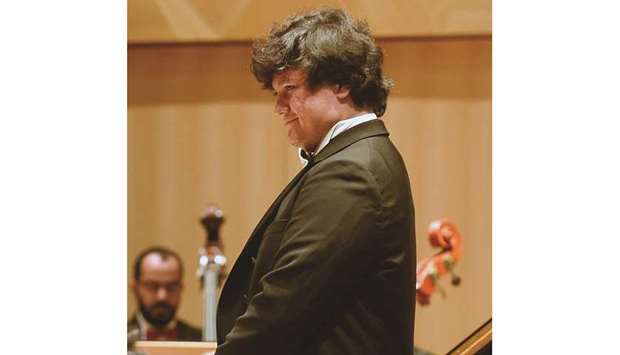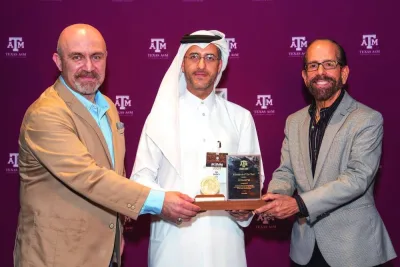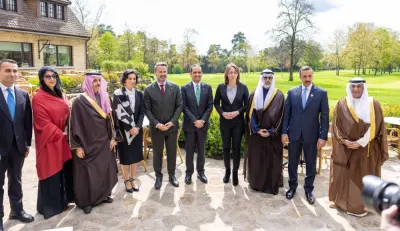Orchestral music is classic European music that is often called as intellectual or philosophical music. The genre has been welcomed with open arms in Doha.
Thanks to Qatar Philharmonic Orchestra QPO), established in 2007, lovers of orchestral music have been able to quench their thirst for the last 12 years. The QPO has not only been successful in pulling crowds of music lovers in Doha but also bringing some extraordinary musicians and instrumentalists from other countries.
The orchestra organised its first concert of the 2019-2020 season recently at Qatar National Convention Centre QNCC). The orchestral concert was led by Aziz Shokhakimov, a young and talented conductor from Uzbekistan. The conductor, who is based in Germany, aptly led the orchestra for the entertainment and satisfaction of the elite audience that included Qatari dignitaries and members of international diplomatic community.
Community sat down with young Aziz to discern his journey as a musician, love for orchestral music and tips for aspiring conductors.
Sharing his early life and career, Aziz said: “I was born in Tashkent in 1988 and began studying at the Uspensky Music School for musically gifted children at the age of six. I first studied violin and viola, followed by conducting with noted musicians.”
Aziz burst on the international scene at the age of just 21 by astounding audiences in Bamberg. “Next to my symphonic career, I am also active in the field of opera. In 2013-14, I directed Tchaikovsky’s Eugene Onegin at the Teatro Communale di Bologna. At Deutsche Oper am Rhein, I conducted a revival of Carmen, an opera in four acts, after which I was engaged as Kapellmeister, starting in 2015-16.”
Having been selected from amongst more than 100 candidates for the finals weekend with the Camerata Salzburg, Austrian chamber orchestra, Aziz went on to win the prestigious Salzburg Festival Young Conductors Award in August 2016. “I returned to the Salzburg Festival in August 2017 for my concert with RSO , enthusing the audience.’
In 2018-19, Aziz returned to Deutsche Kammerphilharmonie Bremen, Düsseldorf Symphoniker, RAI Torino and to a new production of pique Dame at the Deutsche Oper am Rhein. “Debuts include Toronto Symphony, Orchestre national de Lyon, Antwerp Symphony, MDR Leipzig and Bolshoi Theatre in Moscow.”
It all has not been a smooth sailing for the conductor, who first conducted an orchestra when he was only 14. “I faced a lot of difficulty just being with musicians who had over 30 years of experience. As I had to convince them, I read a lot about music. Now, it has been about 20 years that I have been conducting different orchestras.”
Aziz sees his long musical journey as a process of constant learning. “Each year, I see myself as how stupid I was the previous year! I am happy to tell you that I am conducting better than what I did last season (laughs). I hope I will say the same about the next season.
“I am not satisfied with what I have been doing. This is life. We have to learn. It is like how philosophical people say ‘nobody is your friend and nobody is your enemy but everybody is your teacher’. I always try to learn something new.”
Aziz has set no future goals as far as orchestral music is concerned. “I have no fix plans. However, I want to pursue the music pieces that I want to conduct and some solo piece that I want to sing. Every season, I have had to conduct 60-70 concerts for the last six years. Only once or twice did the orchestra do what I actually wanted them to do (laughs). I have big expectations when it comes to my interpretations (of a music piece). It is not easy. You have to interpret. You have to convince other people.”
The Uzbek likes to perform at Frankfort 3D Orchestra in Germany. “I also like Toronto Symphony Orchestra. As far music, I like compositions of Beethoven the most. Of course, I also love many other composers.”
Aziz likes the overall music of an orchestra but he prefers some instruments over others. “In orchestra, I like horn the most. In general, I will say, I like piano. It is the only instrument which can create the sound of an orchestra.”
The conductor says that every country has different kinds of orchestras. “For instance, in Germany, they play orchestra after the beat. It is not precisely on the beat but after the beat. The orchestra waits for the conductor. When you compare it with American orchestra, they are on the beat. I think the conductor has to be very sensitive about such kind of things — for example, how to forge a relationship with the orchestra. Different orchestras have different styles. The professionalism of a conductor (is in) how he or she conducts it.”
In response to a question about how an orchestra maintains a relationship with the audience, he said: “Sometimes, you have very good performance with the orchestra but the audience is not very enthusiastic. At other times, the orchestra may not be satisfied with the result but the public gets very enthusiastic. You never know. It has happened with me.”
Aziz is optimistic about the future of classical orchestral music. “I hope the music has a bright future. This is very intellectual music. This is very spiritual music. I respect all genres of the music but the classical European music is at another level of intellectualism. This music has more colours, harmony and emotions. You have everything in classical music.
“I am very happy that Qatar has such a popular and successful orchestra. This is a very strong orchestra. It is also great to see that you have people here to support the orchestra.”
Aziz urges young conductors to learn more about classical orchestral music. “There are some professional musicians who do not know much about classic music. Aspiring conductors need to know what the music is about and what emotions the music depicts. Sometimes, I see my colleagues cannot even read what is written in the choir.
“For beginners, it is important to start playing some famous master pieces. It will help them build their interest in the music. It is also important to read about the life and other works of a composer.”
Community / Entertainment
“The classical European music is at another level of intellectualism” — Aziz Shokhakimov, Uzbek music conductor

..


